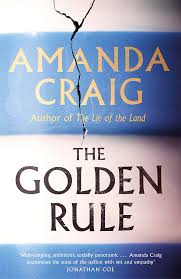Book: The Golden Rule by Amanda Craig, Little Brown, £16.99
Author: Amanda Craig
Publisher: Little, Brown
Price: £16.99
What should we do when someone who ought to love us hurts us instead? This is the central question of Amanda Craig’s ninth novel, The Golden Rule, which is equal parts crime novel and social commentary, neatly wrapped up in some very beautiful nature writing. It was a pleasant surprise for me to find out that large parts of it are set in Cornwall, since the south of England has special memories for me. The descriptions of the place, both real and imaginary, are pretty convincing, and she captures the south perfectly: its natural beauty, wildness, un-Englishness and, of course, casual racism.
The plot references Patricia Highsmith’s novel, Strangers on a Train, in which two men have a chance meeting on a train and decide to bump off each others’ troublesome relatives. No one can connect them; so on the face of it, it’s the perfect crime. But Craig adds several twists of her own, so the resemblance to Highsmith is only superficial. For a start, both of the conspirators here are women. The protagonist, Hannah Penrose, is an interesting straddler of social categories: small town girl from Cornwall, determined to go to university and make it big, falls for the wrong guy, watches her dreams turn sour, is grossed out by the laddish work culture of advertising and is now being blamed by her husband for having the child he wouldn’t let her abort.

The Golden Rule by Amanda Craig, Little Brown, £16.99 Amazon
When the book opens, she is locked in a struggle to get her husband to pay the rent while secretly working as a cleaner for well-off London families to support her child. As the local girl who made good, she can’t even tell her family back home what she does for a living, but in the manner of families they probably figure it out. She’s in an impossible situation and is ripe for the nudge that her temptor on the train is about to give her: solve all your problems with just one decisive blow! It’s noteworthy that in both Highsmith’s and Craig’s novels, the proposer of the pact is the wealthier and more powerful of the two conspirators: outsourcing murder is just yet another way in which the privileged classes get their jollies.
But Hannah is no pushover, and as she sets about keeping her end of the bargain, she starts to have doubts, first about the nature of the man she is supposed to kill, and then about other aspects of her new acquaintance’s story. The surprises in the plot are beautifully constructed in the best traditions of crime writing, but that’s almost an incidental douceur: Craig’s agenda here is bigger than simply writing a novel of suspense. No, she’s after the root and nature of violence itself. Why do people break the Golden Rule, which states simply, ‘Do as you would be done by’ and can be arguably seen as the basis of all civilization? And it’s not just the abusive spouses in the story who break it: it’s every casual exploiter who shows up on the horizon. Hannah’s position as an educated person forced to do menial work for the rich makes her the perfect reference point for this aspect of the book’s social commentary.
Another charming feature of the story is the centrality of books and reading. This allows Craig to have her characters talk about reading and what it does to people, and she argues that by promoting empathy, fiction is one of the forces in people’s lives that back up the Golden Rule. Although Hannah blames her reading for her youthful illusions that make her choose marriage over independence, it’s also clear that books have given her the insight to detect the nonsense of others.
Craig also manages to work in Britain’s current social, economic and political meltdown without shoving it too obviously to the fore. Mostly she does this through the fiercely independent Cornish people who populate the book. Cornwall has a history of sedition: when Henry VIII tried to impose his newfangled religion and the English language on them, the Cornish rose up and almost threw his priests and officers out, but he retaliated with one of the bloodiest pogroms England has ever carried out against its own people.
Craig writes connected-world novels, and minor characters in this book have full story arcs elsewhere. If you enjoy this book, you will probably want to follow the stories of the other people you met along the way. And there is a lot to enjoy: a tight, neatly braided plot, wonderful locales full of magic and mystery, deep characters to puzzle out, social commentary and insights into people’s moral universes. All of this is wrapped up in a beautifully evocative style that manages to be lush without being overblown. She does have occasional moments of sententiousness, but they come at points where it makes sense for the characters to have them, so they don’t jar. All in all, a book you won’t regret buying.










